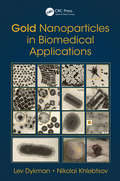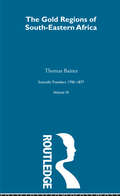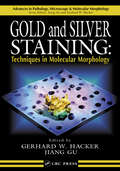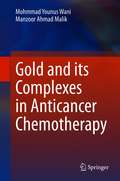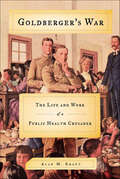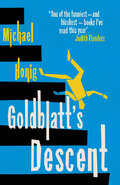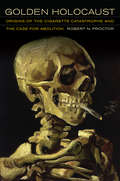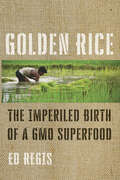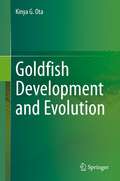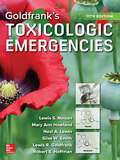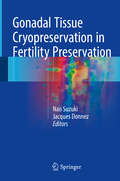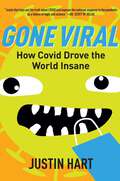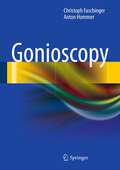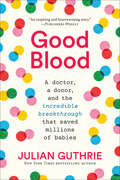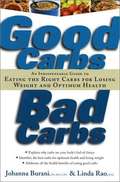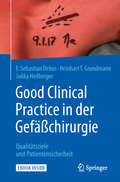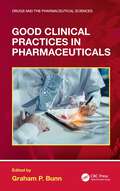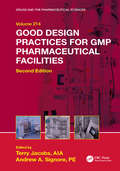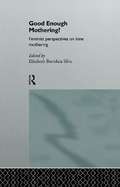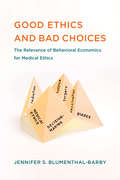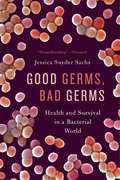- Table View
- List View
Gold Nanoparticles in Biomedical Applications
by Lev Dykman Nikolai KhlebtsovThis book discusses fabrication of functionalized gold nanoparticles (GNPs) and multifunctional nanocomposites, their optical properties, and applications in biological studies. This is the very first book of its kind to comprehensively discuss published data on in vitro and in vivo biodistribution, toxicity, and uptake of GNP by mammalian cells providing a systematization of data over the GNP types and parameters, their surface functionalization, animal and cell models. As distinct from other related books, Gold Nanoparticles in Biomedical Applications discusses the immunological properties of GNPs and summarizes their applications as an antigen carrier and adjuvant in immunization for the preparation of antibodies in vivo. Although the potential of GNPs in nanobiotechnology has been recognized for the past decade, new insights into the unique properties of multifunctional nanostructures have recently emerged. With these developments in mind, this book unites ground breaking experimental data with a discussion of hybrid nanoparticle systems that combine different nanomaterials to create multifunctional structures. These novel hybrids constitute the material basis of theranostics, bringing together the advanced properties of functionalized GNPs and composites into a single multifunctional nanostructure with simultaneous diagnostic and therapeutic functions. Such nanohybrids can be physically and chemically tailored for a particular organ, disease, and patient thus making personalized medicine available.
Gold Region:Sci Tra 1791-1877
by Thomas BainesThis book contains a preface, a memoir and an obituary notice, which together provide a good account of Thomas Baines' life. It includes advertisements aimed especially at would-be emigrants to South Africa. The book is an important document of colonial history and South African history.
Gold and Silver Staining: Techniques in Molecular Morphology (Advances in Pathology, Microscopy, & Molecular Morphology)
by Gerhard W. Hacker Jiang GuImmunogold silver staining is one of the most sensitive techniques available for visualizing the location of antibodies and nucleotide probes that have been bounded to specific antigens or to nucleotide sequences. As gold and silver staining continues to advance research in molecular morphology, this book presents the information you need to know a
Gold and its Complexes in Anticancer Chemotherapy
by Mohmmad Younus Wani Manzoor Ahmad MalikThis book presents an overview of cancer and the genesis, and development of different treatment strategies and modalities against cancer. The emergence of gold and its complexes as promising anticancer chemotherapeutic agents have the potential to substitute or replace the platinum based chemotherapeutic agents. Gold complexes have demonstrated considerable anti-proliferative properties, chiefly attributed to their anti-mitochondrial effects, they make gold complexes excellent candidates as anti-cancer agents compared to their platinum-based counterparts. This book provides a critical review of recent advances made in the development of gold complexes as anti-cancer agents. In this context, it examines a number of different ligand architectures, provides comprehensive information on gold complexes’ mechanism of action and toxicity issues and, in closing, outlines future research directions.
Goldberger's War: The Life and Work of a Public Health Crusader
by Alan M. KrautFor fans of Guns, Germs, and Steel, Alan M. Kraut's Goldberg's War tells the story of one doctor's courageous journey to cure deadly diseases and epidemics.Goldberger's War chronicles one of the U.S. Public Health Service's most renowned heroes--an immigrant Jew who trained as a doctor at Bellevue, became a young recruit to the federal government's health service, and ended an American plague. He did so by defying conventional wisdom, experimenting on humans, and telling the South precisely what it didn't want to hear.Kraut shows how Dr. Goldberger's life became, quite literally, the stuff of legends. On the front lines of the major public-health battles of the early 20th-century, he fought the epidemics that were then routinely sweeping the nation--typhoid, yellow fever, and the measles. After successfully confronting (and often contracting) the infectious diseases of his day, in 1914 he was assigned the mystery of pellagra, a disease whose cause and cure had eluded the world for centuries and was then afflicting tens of thousands of Americans every year, particularly in the emerging "New South." “Engrossing story of an American medical hero.” —The New England Journal of Medicine
Goldblatt's Descent
by Michael HonigA biting, brilliant, black tragicomedy of doctors, patients, lost hopes, and last chances. "But I just killed someone!" "I don't know if I'd shout about it if I were you." Malcolm Goldblatt paused. 'Look, you didn't kill him. It was waiting to happen. You just. . . helped.' 'Malcolm, they'll strike me off!' 'They can't strike you off. You're still a House Officer. They haven't struck you on yet. . .' Malcolm Goldblatt has one last chance. Life, or his own obstinacy, has dumped him at the door of Professor Andrea Small's medical unit, where he will have the privilege of ministering to the world's most unimportant disease. But in so many ways, this unit is like all the others that Goldblatt has worked on, from Dr Madic's ferocious aversion to work, to Dr Burton's knife-in-the-back ambition, right up to the monstrous vanities of the professor herself—and that's before he even meets the patients. Soon the familiar cycle of hope and despair threatens to drag him into its eddy, and with his finger never far from the self-destruct button, the temptation to press it for what will surely be the final time begins to feel less like professional suicide and more like salvation.
Golden Holocaust: Origins of the Cigarette Catastrophe and the Case for Abolition
by Robert N. ProctorThe cigarette is the deadliest artifact in the history of human civilization. It is also one of the most beguiling, thanks to more than a century of manipulation at the hands of tobacco industry chemists. In Golden Holocaust, Robert N. Proctor draws on reams of formerly-secret industry documents to explore how the cigarette came to be the most widely-used drug on the planet, with six trillion sticks sold per year. He paints a harrowing picture of tobacco manufacturers conspiring to block the recognition of tobacco-cancer hazards, even as they ensnare legions of scientists and politicians in a web of denial. Proctor tells heretofore untold stories of fraud and subterfuge, and he makes the strongest case to date for a simple yet ambitious remedy: a ban on the manufacture and sale of cigarettes.
Golden Rice: The Imperiled Birth of a GMO Superfood
by Ed RegisThe first book to tell the shocking story of Golden Rice, a genetically modified grain that provides essential Vitamin A and can save lives in developing countries—if only they were allowed to grow it.Ordinary white rice is nutrient poor; it consists of carbohydrates and little else. About one million people who subsist on rice become blind or die each year from vitamin A deficiency. Golden Rice, which was developed in the hopes of combatting that problem by a team of European scientists in the late '90s, was genetically modified to provide an essential nutrient that white rice lacks: beta-carotene, which is converted into vitamin A in the body. But twenty years later, this potentially sight- and life-saving miracle food still has not reached the populations most in need—and tens of millions of people in India, China, Bangladesh, and throughout South and Southeast Asia have gone blind or have died waiting. Supporters claim that the twenty-year delay in Golden Rice's introduction is an unconscionable crime against humanity. Critics have countered that the rice is a "hoax," that it is "fool's gold" and "propaganda for the genetic engineering industry." Here, science writer Ed Regis argues that Golden Rice is the world's most controversial, maligned, and misunderstood GMO. Regis tells the story of how the development, growth, and distribution of Golden Rice was delayed and repeatedly derailed by a complex but outdated set of operational guidelines and regulations imposed by the governments and sabotaged by anti-GMO activists in the very nations where the rice is most needed. Writing in a conversational style, Regis separates hyperbole from facts, overturning the myths, distortions, and urban legends about this uniquely promising superfood. Anyone interested in GMOs, social justice, or world hunger will find Golden Rice a compelling, sad, and maddening true-life science tale.
Goldfish Development and Evolution
by Kinya G. OtaThis book explains how the beautiful goldfish body develops from a single fertilized egg and how this developmental process was changed during the process of domestication. The contents can be categorized as follows: i) numerous high-quality live photo images of embryonic and larval stage goldfish, ii) detailed descriptions of skeletogenesis with fluorescent microscopic and histological images, iii) the most advanced interpretation of the relationship between artificial selection and developmental processes, iv) future perspectives of the application of the genome editing techniques for the ornamental goldfish breeding, and v) methodological descriptions for goldfish developmental biology. Goldfish is a popular ornamental domesticated fish species, and its highly diverged morphological features and color variations attract fanciers. The goldfish has been spread all over the world by breeders, and this fish has also been employed as an experimental organism by researchers in the field of life science. However, so far, no available scientific books provide a detailed description of the embryogenesis and morphogenesis of this animal. Compared with the number of published fancier books, the number of books on goldfish biology is very few. This publication will be useful not only for the research community particularly in the fields of developmental biology, evolutionary biology, zoology, aquaculture, fishery science, and related areas but also for enthusiastic goldfish fanciers and breeders.
Goldfrank’s Toxicologic Emergencies, Eleventh Edition
by Lewis S. Nelson Mary Ann Howland Neal A. Lewin Silas W. Smith Lewis R. Goldfrank and Robert S. HoffmanGoldfrank’s is the premier toxicology textbook that should be in every emergency department or poison center library. Whether you are a student, resident, or faculty, there is something here for you. If you are a toxicology fellow or poison specialist studying for your boards, this is your go-to book. I highly recommend this work... —The Journal of Emergency Medicine <BR> The best edition yet of the landmark text in medical toxicology <BR> A Doody’s Core Title for 2021! <P><P> Covering every aspect of poison management, this indispensable case-based resource has been thoroughly refreshed to deliver evidence-based principles viewed through the lens of an active bedside clinical practice. In no other reference will you find such a diverse roster of esteemed editors and authors who deliver expert insights into every type of toxicologic emergency, whether due to substance abuse or exposure to toxins. <P><P> Fully referenced and supported by a cohesive organization and full-color format, Goldfrank’s begins with a historical perspective on medical toxicology principles and the general approach to the patient. It then progresses to the fundamental principles of medical toxicology, encompassing biochemical and molecular concepts; the effect of xenobiotics on vital organs and body systems; and toxicologic principles in special populations. <P><P> The Eleventh Edition of Goldfrank’s Toxicologic Emergencies is the most rigorous volume to date, driven by a precise analysis of the latest medical literature and complex cases designed to facilitate differential diagnosis. <P><P> New to this Edition: <BR> • Additional cases and “Special Considerations” chapters designed to enhance clinical decision-making and patient outcomes <BR> • New “Antidotes in Depth” provides timely, critical information on toxicologic treatment strategies <BR> • New content on toxicogenomics explores its increasingly important role in predictive toxicology <BR> • Chapter-ending bulleted summaries of key points <BR> • Updated coverage of synthetics such as “K2” <BR? • Revised chapters on medical, clinical, and chemical toxicology include updated insights on poison emergencies, treatment strategies, and risk assessment tools
Goldman-Cecil Medicine Vol 1
by Lee Goldman Andrew L. SchaferGoldman-Cecil Medicine offers definitive, unbiased guidance on the evaluation and management of every medical condition. 25th edition
Goldman-Cecil Medicine, Vol 2
by Lee Goldman Andrew L. SchaferGoldman-Cecil Medicine offers definitive, unbiased guidance on the evaluation and management of every medical condition, presented by a veritable "Who's Who" of modern medicine. A practical, straightforward style; templated organization; evidence-based references; and robust interactive content combine to make this dynamic resource quite simply the fastest and best place to find all of the authoritative, state-of-the-art clinical answers you need.
Gonadal Tissue Cryopreservation in Fertility Preservation
by Jacques Donnez Nao SuzukiThis book is a practical guide to thecryopreservation and transplantation of oocytes, embryos, and ovarian andtesticular tissue for fertility preservation. Illustrated with a wealthof figures and photos, it provides updated techniques for clinicians,technicians, and researchers. This book also gives insights into in vitroactivation (IVA), in vitro growing (IVG), and in vitro maturation (IVM), withboth basic research and future directions. These techniques combined withcryopreservation will improve the chances of reproduction. Cryopreservation isessential to protect fertility in cancer patients who undergo treatment withradioiodine or chemotherapy, which may cause damage to their reproductiveorgans, and also for primary ovarian insufficiency patients. The book alsoincludes a chapter on the risk of the presence of malignant cells in ovariantissue. Both editors are pioneering researchers in this field.
Gone Before Goodbye
by Harlan Coben Reese WitherspoonAn unforgettable suspense novel that combines the storytelling talents of Academy Award-winning actor Reese Witherspoon and internationally bestselling author Harlan Coben. Gone Before Goodbye is the story of a woman trapped in a deadly conspiracy—where uncovering the truth could cost her everything. Maggie McCabe is teetering on the brink. A highly skilled and renowned Army combat surgeon, she has always lived life at the edge, where she could make the most impact. And it was all going to plan ... until it wasn&’t. Upside down after a devastating series of tragedies leads to her medical license being revoked, Maggie has lost her purpose, but not her nerve or her passion. At her lowest point, she is thrown a lifeline by a former colleague, an elite plastic surgeon whose anonymous clientele demand the best care money can buy, as well as absolute discretion. Halfway across the globe, sequestered in the lap of luxury and cutting-edge technology, one of the world&’s most mysterious men requires unconventional medical assistance. Desperate, and one of the few surgeons in the world skilled enough to take this job, Maggie enters his realm of unspeakable opulence and fulfills her end of the agreement. But when the patient suddenly disappears while still under her care, Maggie must become a fugitive herself—or she will be the next one who is ... Gone Before Goodbye
Gone Viral: How Covid Drove the World Insane
by Justin HartData and marketing consultant and statistical sage to presidential candidates, governors, businesses, and the real powers-that-be, epidemiologists, Justin Hart catalogs in a terrifying-but-sprightly manner the folly and psychosis produced by the pandemic and diagnoses the societal destruction that the massive overresponse to the COVID virus has wreaked, as well as what can be done to stop the madness and bring the world back to a modicum of rationality.WORST. DISEASE. EVER. Someone broke America. In this nightmare, neighbors have turned into agoraphobes, teachers fear their students, children are muzzled, citizens are censored, dystopian fictions have become reality, and unelected officials are creating a biometric police state. Oh wait. It&’s not a nightmare. It&’s our daily lives! In truth, much of this insanity didn&’t start with the coronavirus pandemic (it was already latent in big government and big corporations) and it won&’t end there. COVID-19&’s greatest threat turned out to be . . . mental. All we had to fear was fear itself—and boy did some of us fear! The very idea of the virus weakened the immune system of America and revealed a decaying underbelly of confusion, panic, unease, and cowardice few of the strong ones suspected existed. What a horrible wake-up call! In a spate of anxious dread and gleeful power-grabbing, our health overlords threw away the pandemic response handbook and tried—beyond all reason—to protect, well, everyone. From massive over-testing to universal retail plexiglass to stay-at-home orders to stay-away-from-school orders to masking mandates to vaccine mandates to some of the worst restrictions on civil liberties in American history, this is an epic story that poses big questions about America&’s future as a free society. And the odd thing is, as Justin Hart shows, the actual disease was, as pandemics go, not that threatening; most people were at minimal risk. What is really scary is the total overreaction of half the country, many governments, that lost all sense of perspective. Hart offers a hopeful prescription on how we might face the madness down and claw our way back to sanity!
Gonioscopy
by Christoph Faschinger Anton HommerGonioscopy is a very important differential diagnostic tool that permits assessment of the anterior chamber angle and correct classification of glaucoma as a basis for specific treatment. This book clearly explains how to perform gonioscopy to best effect. The anatomy of the chamber angle is systematically described, and the impact of age, developmental disorders, and other pathologies on the chamber angle is explained. Particular attention is focused on primary and secondary open-angle and angle-closure glaucomas. In each case, the role of gonioscopy in evaluating the chamber angle is described with the help of many photographs and illustrations. The importance of knowledge of the chamber angle for laser treatment and surgery is fully explained, and the impact of medications is discussed. The practitioner will find in Gonioscopy all the information required to use the technique effectively in diagnosis and treatment.
Good Blood: A Doctor, a Donor, and the Incredible Breakthrough that Saved Millions of Babies
by Julian GuthrieThe New York Times–bestselling author of How to Make a Spaceship presents the remarkable, uplifting story of a life-saving medical breakthrough. In 1951 in Sydney, Australia, a fourteen-year-old boy named James Harrison was near death when he received a transfusion of blood that saved his life. A few years later, and half a world away, a shy young doctor at Columbia University realized he was more comfortable in the lab than in the examination room. Neither could have imagined how their paths would cross, or how they would change the world. In Good Blood, Julian Guthrie tells the gripping tale of the race to cure Rh disease, a horrible blood disease that caused a mother’s immune system to attack her own unborn child. The story is anchored by two very di?erent men on two continents: Dr. John Gorman in New York, who would land on a brilliant yet contrarian idea, and an unassuming Australian whose almost magical blood—and his unyielding devotion to donating it—would save millions of lives. Good Blood takes us from research laboratories to hospitals, and even into Sing Sing prison, where experimental blood trials were held. It is a tale of discovery and invention, the progress and pitfalls of medicine, and the everyday heroics that fundamentally changed the health of women and babies.
Good Carbs, Bad Carbs: An Indispensable Guide To Eating The Right Carbs For Losing Weight And Optimum Health
by Johanna Burani Linda RaoContrary to prevailing myths that promote high-protein, low-carbohydrate diets, carbohydrates are, in fact, your body's fuel of choice. Now Good Carbs, Bad Carbs makes clear that all carbs, however, are not created equal. It explains how to use the glycemic index-a ranking of carbs based on the rate and level at which the body digests them-to identify the carbs that are best for losing weight, staying healthy, controlling blood glucose levels, and maintaining energy throughout the day. Good Carbs, Bad Carbs will show you how to "diet" without the hunger pangs, headaches, and irritability-from which many dieters suffer. Organized in an easy-to-browse format, Good Carbs, Bad Carbs features: A thorough guide to how carbs work-and why your body prefers them Clear advice for the best carbs to help you lose weight Good carbs for kids Plus ten delicious, easy-to-prepare recipes Packed with essential information that no informed eater should be without, Good Carbs, Bad Carbs will show you how to adjust your eating habits and strike the perfect balance of carbohydrates for optimum health, weight, and vitality.Johanna Burani, M.S., R.D., C.D.E., is a registered dietitian and certified diabetes educator with more than eleven years experience in nutritional counseling. She is the co-author of The Glucose Revolution Life Plan. Linda Rao, M.ED., a freelance writer and editor, has been writing and researching health topics for the past twelve years. Her work has appeared in Prevention, Cooking Light, and Health.
Good Cascade Impactor Practices, AIM and EDA for Orally Inhaled Products
by Svetlana A. Lyapustina Jolyon P. Mitchell Terrence P. TougasThe purpose of this publication is to introduce a new, simpler and more effective way in which to interpret pharmaceutical aerosol particle size data from orally inhaled products (OIPs). Currently, the compendial and regulatory requirements dictate the need for measurements by full resolution multi-stage cascade impactor (CI), a process that is demanding for the operator, time consuming, prone to experimental error, and challenging for method transfers from one laboratory to another. Furthermore, we shall show that the current practice of reducing information from mass-weighted aerodynamic particle size distribution (APSD) measurements through the use of CI stage groupings is not the most effective decision-making tool for OIP quality control (QC) in comparison with newly introduced, mutually-independent efficient data analysis (EDA) metrics that can be derived either from full resolution or abbreviated impactor measurements (AIM).
Good Clinical Practice in der Gefäßchirurgie
by E. Sebastian Debus Reinhart Grundmann Julika HeilbergerIn dem Buch werden Zielparameter definiert, die im Rahmen eines Qualitätsmanagementsystems unter optimalen Bedingungen erreichbar sind, sowie Strukturen und Prozesse dargestellt, die der Patientensicherheit dienen. Die Ergebnisqualität wird beispielhaft anhand der drei häufigsten im Krankenhaus behandelten gefäßchirurgischen Erkrankungen (extrakranielle Karotisstenose, abdominelles Aortenaneurysma, periphere arterielle Verschlusskrankheit) analysiert. Die Kapitel zur Prozess- und Strukturqualität sowie zur Patientensicherheit sind für alle chirurgischen Fächer in gleicher Weise relevant und berücksichtigen zum Beispiel die Handhabung von Ablaufpfaden und Checklisten, den Personalschlüssel auf Station, die Organisation der Intensivstation oder das Fehlermanagement.
Good Clinical Practices in Pharmaceuticals (Drugs and the Pharmaceutical Sciences)
by Graham P. BunnGood clinical practice (GCP) is a set of internationally recognized ethical and scientific quality requirements that must be followed when designing, conducting, recording, and reporting trials that involve the participation of human subjects. Compliance with GCP assures patients and the public that the rights, safety, and wellbeing of people taking part in studies are protected and that research data is reliable. Presents details on GCP, the international ethical, scientific, and practical standard to which all clinical research is conducted. Provides the most up‑to‑date and best practices, techniques, and methodologies in good clinical practice. Discusses applicable laws and regulations supporting GCP compliance, quality and operations. Describes who is responsible for implementing and maintaining quality assurance and quality control systems to ensure that studies are conducted and data are generated, documented, and reported in compliance with the protocol.
Good Design Practices for GMP Pharmaceutical Facilities (Drugs and the Pharmaceutical Sciences)
by Terry Jacobs Andrew A. SignoreThis revised publication serves as a handy and current reference for professionals engaged in planning, designing, building, validating and maintaining modern cGMP pharmaceutical manufacturing facilities in the U.S. and internationally. The new edition expands on facility planning, with a focus on the ever-growing need to modify existing legacy facilities, and on current trends in pharmaceutical manufacturing which include strategies for sustainability and LEED building ratings. All chapters have been re-examined with a fresh outlook on current good design practices.
Good Enough Mothering?: Feminist Perspectives on Lone Motherhood
by Elizabeth Bortolaia SilvaCurrently, lone mothers and their children make up almost 20 per cent of families with dependent children in the UK, a threefold increase since 1970. Yet, while they are often cited by politicians as both a symptom and cause of social breakdown, relatively little is known of the causes, consequences and conditions of lone motherhood in Britain and throughout Europe. Good Enough Mothering? provides accounts of historical patterns of mothering and ideologies of the family with cross-national comparisons of policies and experience of lone motherhood in developed and developing countries. Countries include: Britain, US, Norway, South Africa, Kenya, Thailand, India, Brazil and the Caribbean. This engaging edited collection will appeal to students of social policy, women's studies and social work.
Good Ethics and Bad Choices: The Relevance of Behavioral Economics for Medical Ethics (Basic Bioethics)
by Jennifer S. Blumenthal-BarbyAn analysis of how findings in behavioral economics challenge fundamental assumptions of medical ethics, integrating the latest research in both fields.Bioethicists have long argued for rational persuasion to help patients with medical decisions. But the findings of behavioral economics—popularized in Thaler and Sunstein&’s Nudge and other books—show that arguments depending on rational thinking are unlikely to be successful and even that the idea of purely rational persuasion may be a fiction. In Good Ethics and Bad Choices, Jennifer Blumenthal-Barby examines how behavioral economics challenges some of the most fundamental tenets of medical ethics. She not only integrates the latest research from both fields but also provides examples of how physicians apply concepts of behavioral economics in practice. Blumenthal-Barby analyzes ethical issues raised by &“nudging&” patient decision making and argues that the practice can improve patient decisions, prevent harm, and perhaps enhance autonomy. She then offers a more detailed ethical analysis of further questions that arise, including whether nudging amounts to manipulation, to what extent and at what point these techniques should be used, when and how their use would be wrong, and whether transparency about their use is required. She provides a snapshot of nudging &“in the weeds,&” reporting on practices she observed in clinical settings including psychiatry, pediatric critical care, and oncology. Warning that there is no &“single, simple account of the ethics of nudging,&” Blumenthal-Barby offers a qualified defense, arguing that a nudge can be justified in part by the extent to which it makes patients better off.
Good Germs, Bad Germs: Health And Survival In A Bacterial World
by Jessica Snyder SachsPublic sanitation and antibiotic drugs have brought about historic increases in the human life span; they have also unintentionally produced new health crises by disrupting the intimate, age-old balance between humans and the microorganisms that inhabit our bodies and our environment. As a result, antibiotic resistance now ranks among the gravest medical problems of modern times. Good Germs, Bad Germs tells the story of what went terribly wrong in our war on germs. It also offers a hopeful look into a future in which antibiotics will be designed and used more wisely, and beyond that to a day when we may replace antibacterial drugs and cleansers with bacterial ones.
